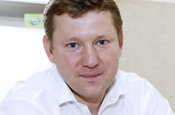As UK chief executive of the world's biggest media agency, Jed Glanvill, who has held the top position for four years, is wary of worldwide decisions that impact on the UK. Following the dotcom bust, WPP bosses thought it best to roll MindShare and Ogilvy's digital divisions into one - in 2003, MOne was born.
"As with most joint ventures, it didn't work," says Glanvill. "The two shareholders both wanted different things and weren't aligned to the same goal. Digital was too fundamental to put into a joint venture - it was the wrong thing to do."
At the time, Glanvill had just moved to the role of futures director, up from head of MindShare's digital arm. In 2004, promoted to managing director, he inherited the majority of MOne, which became MindShare Interaction.
Five years on and Glanvill is once again in the thick of it, this time as chief executive of MindShare UK, an agency going through its biggest changes in years, albeit strategic rather than structural.
House of Media, central to MindShare's proposition since its establishment over a decade ago, is no more. The various "rooms" in House of Media enabled MindShare to highlight its expertise in specialisms from digital to direct response and TV. MindShare is altering to cope with what Glanvill calls clients' paradoxical demands of wanting an integrated agency, full of specialists.
Business planning
House of Media was a global initiative, but MindShare UK embraced the concept more than most, going to great lengths to highlight its wealth of specialist knowledge. With that model gone, MindShare is introducing a new framework, where the aim is to become its clients' business partner.
"Business planning is the starting point," says Glanvill. "We believe we are best-placed to be our clients' business partner because they trust us with one of their biggest expenses, and we clearly understand return on investment. In addition, we develop knowledge on what's driving sales and provide real insights."
A business planning team will establish clients' challenges before client leadership teams (one for every client) develop an appropriate brief. An invention team, described by Glanvill as the epicentre of the agency, will then solve any problems. An investment team, The Exchange, will deal with all trading matters.
Drawing largely on MindShare Performance and MindShare Interaction, the invention team will include content creation in its media plan. As with House of Media, MindShare UK is taking the lead with the new structure. Glanvill has been working on reshaping the UK agency for some time, while MindShare's worldwide restructure was only announced last month.
As well as relishing the opportunity to direct changes at MindShare, Glanvill clearly likes talking business. He's a man who separates work from leisure, spending the working week in London and his spare time at the family home in Somerset. A theme through both is that he cares enormously and is dedicated.
Eight years at BBJ, the forerunner to Aegis agency Vizeum, and eight years at MindShare have led Glanvill to the top of the WPP agency. But will he, like others before him, be tempted by a move to GroupM, WPP's trading giant for MindShare, MediaCom, Mediaedge:cia and BJK&E? "This isn't part of my career plan," he says. "I consider myself a MindShare person."
MindShare passion
While praising the role and creation of GroupM, which Glanvill believes put WPP "a step ahead of the game", it's obvious that his passion lies with MindShare. Glanvill proudly reports that MindShare is the second-biggest media agency in the UK, behind sister WPP agency MediaCom.
Nielsen figures put OMD second, but the inclusion of Manning Gottlieb OMD's billings is discounted by Glanvill.
Of course MindShare would like to usurp MediaCom, he says, but it's not all about billings. Under his leadership, MindShare has increased its non-billings revenue to 40% of the total, thanks to music arm BrandAmp, sports activity run with Ford, innovative work with Castrol and Sony PlayStation, and other "non-core" initiatives.
In addition, MindShare's digital team last year oovertook TV in headcount. Cynics could argue this is because digital is an inefficient process, whereas TV has had decades to improve efficiency.
But for the second-biggest (according to Glanvill) media agency in the UK to have more digital experts than TV is a sign of the times and one that Glanvill has worked hard to realise.
He is a firm believer that agency staff should get the chance to progress, to the extent that he's willing to scrap everyone's job title.
Such a move is unlikely, but it proves that, despite pressures from influential stakeholders such as GroupM, MindShare Worldwide and WPP, MindShare man Glanvill has worked hard to retain the autonomy to steer MindShare UK on a course of its own.
CV
2006 Chief executive, MindShare UK
2004 Managing director, MindShare UK
2002 Futures director, MindShare UK
2000 Managing partner, Digital MindShare UK
1992 Graduate trainee to planning director, BBJ Media Services
Feature
Jed Glanvill's MindShare takes the lead
MindShare UK chief executive Jed Glanvill talks to Media Week as the WPP agency goes through some of its biggest changes in years and finds out why he is steering it on a course of its own


